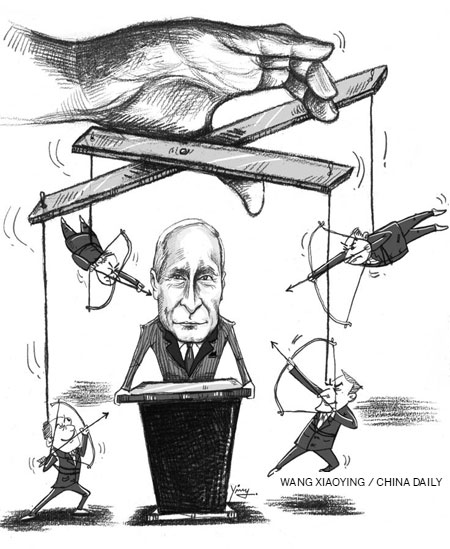The West tries out old tricks in Russia
- By Mikhail L. Titarenko
 0 Comment(s)
0 Comment(s) Print
Print E-mail
China Daily, December 28, 2011
E-mail
China Daily, December 28, 2011

Long before the State Duma elections of Dec 4, the ultra-rightist and liberal mass media, collaborating with anti-Russian elements in the West, forecast that the ruling United Russia party would suffer a serious defeat.
They organized all sorts of sociological surveys to support this thoroughly planned campaign and to push their "predictions" on the "crisis" facing Russian leaders and "sharply declining rating" of Prime Minister Vladimir Putin and President Dmitry Medvedev. The anti-Putin campaign became really vociferous when the United Russia congress officially and unanimously approved Putin as its nominee for the presidential election in March 2012.
It is true that the election results showed the correlation of political forces and sentiments in Russia, which is experiencing the difficult strategic consequences of the disintegration of the erstwhile Soviet Union and the impact of the global economic crisis.
The Russian authorities should learn the lessons from the protests, which shows the global crisis has had a serious impact on Russia's economy. For example, it has increased the cost of housing and utilities substantially, and led to proliferation of corruption, lack of discipline among bureaucrats, strong bureaucratic stranglehold, and chaos in army and military reforms. Quite naturally, these factors have influenced people's attitude toward the United Russia party and the bureaucracy, which has won the "top prize" in terms of public repulsion.
However, the "go ahead" for the nasty campaign came from politicians in the United States, who made it clear that they would not welcome Putin back as president of Russia. The opposition in Russia took the signal immediately and went on the "offensive".
Voters manifested good understanding of the fact that in the past decade as well as during the current difficult times Putin, the non-partisan leader of United Russia, and Medvedev have made substantial efforts to consolidate the country and solve its political and social problems. As for Putin, he has won wide public recognition as a Russian patriot who cares and works for the consolidation and prosperity of the country and to improve the lives and livelihoods of the working people, especially the less-protected section of society.
The West assumes that the disintegration of the Soviet Union was the result of its victory in the Cold War. It hopes that with Western support, separatists and criminals will take the next step to cause the collapse of Russia. In their writings, American politicians such as political scientist and former national security advisor Zbigniew Brzezinski and former secretary of state Madeleine Albright have described scenarios of an expected collapse of Russia and even redrawn its national borders.
Putin, who posed the main geopolitical obstacle to the realization of such goals, outlined the strategy for Russia's revival and consolidation of its status as an important independent country that would cooperate with other countries, including the US, on the principle of equal rights.
As shown by the Dec 4 election results, the United Russia party, notwithstanding the weakening of some of its authority, retained a very considerable percentage of voters' confidence and won 50 percent of the popular votes. The results also reflect that the Russian people still have the undoubted confidence in Putin and Medvedev.
The Western media try to fan the liberal opposition's passions in every which way they can. But the Russian authorities, manifesting maximum tolerance, have allowed such anti-government demonstrations to take place.
Some media outlets are engaged in unbridled propaganda, aimed specifically against Putin. But the Russian people know that it is a preplanned political provocation, designed by anti-Russia elements to destabilize the situation in the run-up to the presidential election.
When the liberal media in Russia and in the West loudly advertise their concern over "democratic development" in Russia, they expose their involvement in efforts to silence true public sentiments, as evident in the protests in the US, Britain, Italy, Germany and France. The demonstrations in the West are aimed against the ruling oligarchs in those countries who have fattened their wallets during the economic crisis and distributed multi-million-dollar bonuses among themselves, thereby aggravating the financial and economic chaos.
The Western media should reflect on their double standard on democracy and protests for justice. As the Holy Bible says, before pointing out a mote in another's eye, they should remove a beam from their own eyes.
The author is president of Russia-China Friendship Association and director of Institute of Far Eastern Studies, affiliated to the Russian Academy of Sciences.
Go to Forum >>0 Comment(s)
 Add your comments...
Add your comments...
- User Name Required
- Your Comment
- Racist, abusive and off-topic comments may be removed by the moderator.





